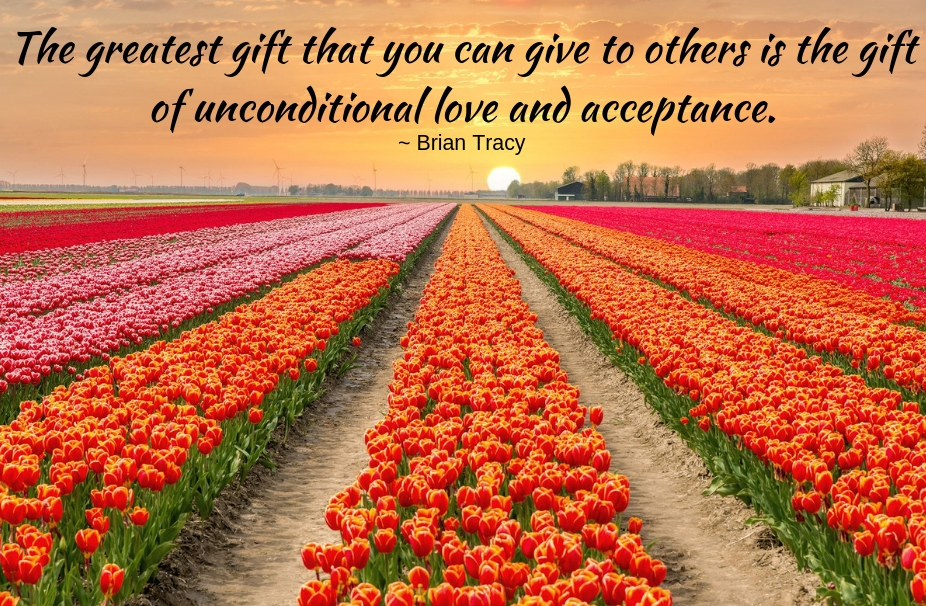
Unconditional love is the active choice to love someone no matter what may come your way…. In unconditional love, satisfaction comes from putting someone else first and prioritizing their health and happiness with no expectation of reward for yourself.”
Nadine Kalinauskas, E-Harmony Article
Love given without any conditions…. none. How do you know if you’ve found it? How do you know if you can give it? How do you know if it is even possible?
There is the love of a parent for a child, but not every parent is good at giving love, especially in the absence of expectations. I was lucky to feel unconditional love from my mother, but not necessarily from my father.
In the area of loving another person, experts agree that unless you first practice unconditional love with yourself, it is not possible to achieve unconditional love with another person. You first need to know that you are worthy of love, see value in yourself, and not need to be dependent on another person for your sense of self-worth. An exception to that might be the unconditional love that we feel coming from a parent or a higher power.
If you skip the step of first cultivating unconditional self-love, you run the risk of staying in relationship with a person who is abusive. Unconditional love should never be an excuse to stay in an unhealthy relationship. I used to be “guilty” of getting into unhealthy relationships and staying too long, hoping that with time and my determination, things would get better. It always got worse rather than better, unfortunately, so I speak from experience!
In the article referenced above by Nadine Kalinauskas, she identifies 32 ways to know if you have found unconditional love. Follow the link to the article if you want to read about all of them. The key ones I want to mention here are:
-
You can tell each other the truth — even when it’s uncomfortable.
-
You can forgive each other freely.
-
You don’t pick fights about petty things or hold grudges. Even when arguing, you respect each other and aim for a healthy resolution.
-
Your partner encourages and inspires you to be the best version of yourself.
-
You both value communication and consider the relationship’s health a priority.
-
You feel safe. You feel “at home” when you’re with your partner.
How about you? Are you capable of loving someone without having expectations?
Is there a difference between “unconditional love” and “unconditional relationships”? If so, what is the difference?
Jeremy Nicholson, MSW, Ph.D (AKA: “The Attraction Doctor”) tells us that there is a difference between the two. He says,
For those who place love above all, there is little distinction between these two concepts . . . However, for those who equally value working partnerships with love, there is a wide distinction between the two concepts. Love can be felt unconditionally, while still maintaining conditional requirements for the partnership.”
In this way, he says we can truly enjoy unconditional love and develop healthy relationships. Love is an emotion and may be unconditional. No matter what someone does, we continue loving them. But that doesn’t mean we don’t set boundaries. How we choose to relate to one another may change despite the continuance of a love that has no boundary. He advises his readers to know before you even begin dating someone whether you are ready for “unconditional love” or an “unconditional relationship”.
Here is a link to read the full article: Do You Believe in Unconditional Love?
You may have love relationships that are 100% unconditional. At the same time, you may have other relationships in which you choose to place conditions on how you interact with each other, while still continuing to love one another. For example, you may unconditionally love someone but decide that you do not want to live with them. Can you identify which is which?
I came across an article with some examples of unconditional love, which the author identifies as “healthy”. These 5 examples are titled:
-
Letting your guard down – feeling safe enough to be yourself, flaws and all
-
Leaning on someone when you’re struggling – being confident that our partner will hold space for us to ask for support, without feeling guilty, ashamed, or insecure for needing help
-
Admitting when you’ve hurt your partner – feeling comfortable enough to tell them when we have made a mistake, without fearing that they will hold it against us
-
Telling your S.O. when you’re scared – being able to admit that we are afraid of something, trusting that we can reveal this secret vulnerability without risk of losing their love
-
Having the ability to empathize – listening with empathy, even if you don’t understand or agree with what they are saying
By Alysha Jeney, “The Modern Love Box”
Now it’s your turn . . . Have you experienced unconditional love? How would you describe it?
Be sure to share this article with anyone you believe would benefit from it. And if you haven’t already done so, you can subscribe to the monthly eNewsletter at no cost by clicking this link:
Authentic Living eNewsletter Susbscription